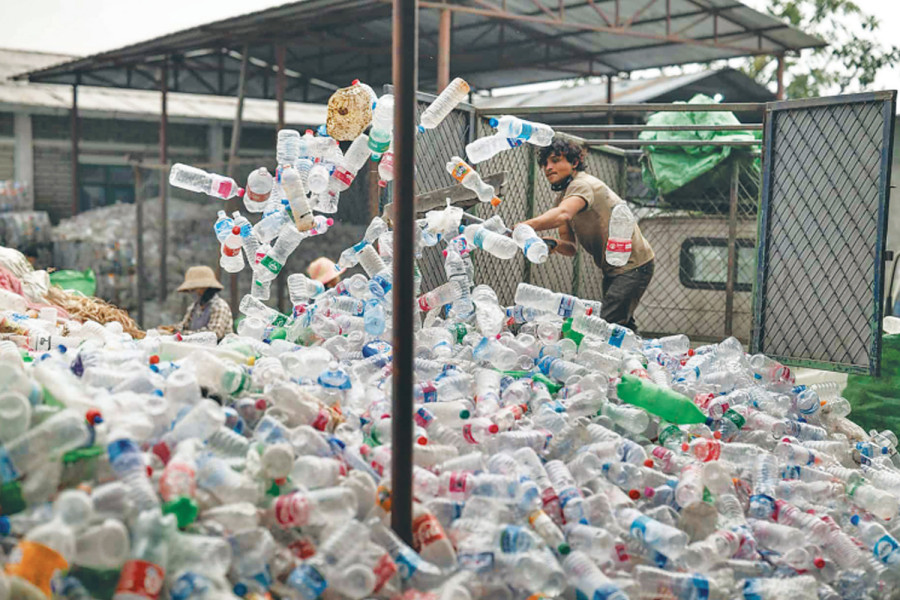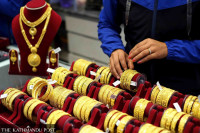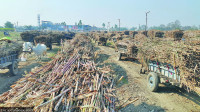Money
Green startups are struggling to scale up
They are paving the way to tackle environmental challenges, but the road ahead is far from easy.
Sarahna Khadka
Himalayan Life Plastic, Nepal’s pioneering plastic recycling company, has been facing several hardships—the latest one being taxes—since it started operation a decade ago.
The company, however, is optimistic about its future.
“We know we are doing something to reduce waste in our communities. But we are taxed heavily,” said Prakash Bharati, the general manager of Himalayan Life Plastic.
The company recycles over 40 million plastic bottles annually.
"In the past few years, we saw a significant slump in the business, but we're now in a phase of recovery," said Bharati. Many green startups are struggling to attract investment, particularly from the private sector.
All used plastic can be turned into new things, but picking it up, sorting it out and melting it down is expensive.
New plastic, on the other hand, is cheap and easy to produce, but there is limited demand for plastic waste and the general public, too, is often reluctant to use recycled plastic.
“Despite operating as a social enterprise, we have been subjected to the same tax rates as commercial enterprises. If there were incentives like VAT exemptions and reduced taxes on imports of machinery, we could expand further,” said Bharati.
The company collects 90 tonnes of plastic waste per month, with 50 percent sourced from Pokhara and the rest from elsewhere in the country.
The company is gradually expanding with the number of collectors growing from 200 to 300. It has extended its collection to over 200 hotels in Pokhara.
The company sells recycled PET (rPET) pellets to local bottle manufacturers.
rPET pellets are the most eco-friendly and sustainable alternative to traditional PET plastic pellets.
Bharati said that using local rPET is more cost-effective compared to imports, which saves Rs45 per tonne in transportation and taxes.
It is estimated that Nepal produces about 4,900 tons of solid waste every day, of which 13 percent is plastic waste.
Entrepreneurs are increasingly launching green startups in Nepal. From tackling environmental challenges to combating the effects of climate change, they are creating innovative technologies and products while also improving business value.
Despite their initiative for sustainable goals, green startups often struggle to attract investment.
The government imposes hefty taxes on such social enterprises also, hindering their growth and sustainability.
Plastics are most commonly used for packaging, building and construction, electrical and electronic equipment. Despite their wide use, plastics have severely impacted human health and the environment.
Management of plastic waste has been a constant challenge globally and also in Nepal.
It has been estimated that 79 percent of all plastic waste generated worldwide has been landfilled or dumped, a further 12 percent incinerated and only 9 percent recycled.
Leaf Plus, another ecopreneurship venture that uses betel nut leaves to make eco-friendly plates, has been growing, but finding it challenging to persuade customers to accept eco-friendly products.
It sources betel nut leaves during March-May from Jhapa, Morang, and Sunsari district. The process takes weeks from collection to moulding in factories.
The company established in early 2017 produces 35 utensil varieties, managing to keep prices low despite increased production.
With a daily output ranging from 8,000 to 10,000 pieces, the company targets bulk sales.
The product is currently available in shopping malls and department stores like Bhatbhateni and Salesberry.
The company plans to scale up with a Rs60 million investment plan.
“Despite tough competition from cheaper plastic alternatives, which can cost as less as Re1 per plate, our products have carved a niche among environment-conscious consumers,” said Mahendra Pandey, sales supervisor at the Kathmandu branch of Leaf Plus. “But persuading people to adopt environment-friendly initiatives is still a challenge.”
The company has also decided to start production of eco-friendly lamps.
Deego Nepal, a producer of eco-friendly daily-use items like herbal soap and baskets, too, has been facing difficulties in marketing its eco-friendly products, according to the company.
It produces bags, body scrubbers, and toothbrushes.
Eco Cell, a construction and eco-friendly brick manufacturing company, established in 2015, saw its sales booming before the pandemic.
Its sales grew to Rs 6 million annually before the pandemic. However, demand for eco-friendly construction materials has subdued.
Nepal's ecopreneurship sector has grown but many ventures are still struggling to become commercially viable.
Insiders say that the Covid pandemic and subsequent slowdown in the economy has posed several challenges for the ecopreneurship to grow.
Doko Recyclers, operating successfully for seven years, has expanded to address Kathmandu's e-waste challenge.
It has over 120 corporate clients and 5,000 households served and aims to prevent recyclable waste from landfills through awareness campaigns and workshops.
Through the USAID Business Accelerator for Clean Air, Doko plans to upgrade its Material Recovery Facility, aiding in paper shredding and recycling, thus reducing CO2 emissions.
“The growing electronic waste is Nepal’s emerging challenge. Doko Recyclers are eyeing sustainable solutions before the problems become unmanageable,” said Arpan Acharya, client manager at Doko.
Nepal's ecopreneurship sector continues to innovate and grow, but addressing financial constraints and regulatory challenges is the key to sustaining them, said Bharati.
The government has also taken steps towards managing e-waste, including the formulation of a draft e-waste management policy and the establishment of an e-waste management fund, but insiders say the implementation part remains weak.
There are approximately 20,000 informal waste collectors in Kathmandu.




 8.84°C Kathmandu
8.84°C Kathmandu













